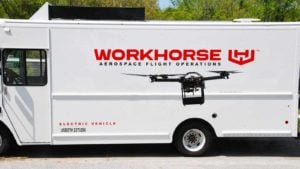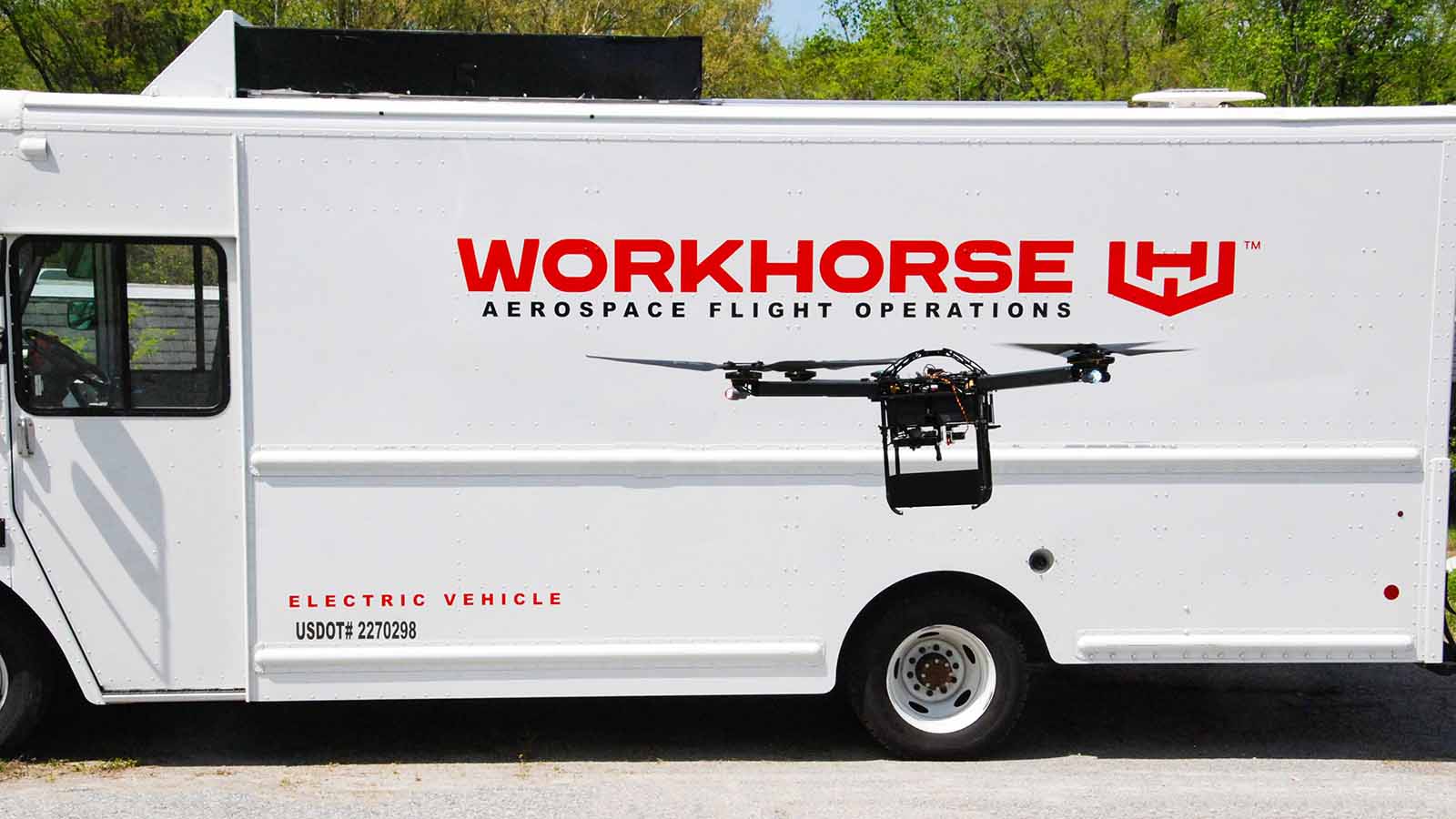Workhorse (NASDAQ:WKHS) has been absolutely on fire in 2020, with WKHS stock skyrocketing 825% higher this year on the back of abundant investor optimism with respect to the company’s ability to disrupt the last-mile delivery market with a next-gen electric delivery van.

This optimism is not misplaced.
All transportation is getting electrified. The last-mile delivery market represents a very big and highly attractive disruption opportunity in this electrification wave. Workhorse is pioneering a best-in-breed solution to lead this disruption.
And, while WKHS has run up a ton in 2020, there’s plenty of upside left in this name over the next few years because the last-mile delivery market is huge (~$18 billion) and Workhorse is still a small company (~$2.7 billion).
So buy WKHS stock and hold it for the long haul.
Here’s a deeper look.
Electrification Is the Future
There’s no doubt about it. The electrification wave has arrived, and over the next decade, it will proliferate across all transportation verticals, from passenger cars to commercial trucks to last mile delivery vans, and everything in between.
There are few trends driving this disruption. All of them are here to stay.
First, consumer demand is shifting.
Young consumers — who were raised to be hyper-aware of the environment and educated on how to reduce carbon emissions — want EVs. A 2018 survey from HPI found that 91% of Millennials are considering buying an electric car for their next vehicle purchase. These young consumers are just now starting to come into jobs and a ton of purchasing power. Over the next decade, they will increasingly drive auto market demand — and if all of them want EVs, then it’s easy to see how EVs take over the passenger car market from a demand perspective in the 2020s.
Second, the technology is getting better.
Because demand is shifting, more and more resources and talent are being thrown into the EV space. This is resulting in huge advancements in EV technology, specifically on the battery front, where companies like Tesla (NASDAQ:TSLA) are increasingly making smaller and better batteries that last longer, charge faster and take up less space — allowing for more efficient vehicles. Such technological advancements will only persist over the next few years, with a potential jump to solid-state batteries being a huge upward catalyst.
Third, the cars are getting cheaper.
Thanks to better technology, more streamlined manufacturing processes and increased scale, the cost to produce EVs is dropping dramatically, resulting in huge drops in EV prices. Since 2013, average EV battery pack prices have fallen 76%, according to Bloomberg New Energy Finance. This is resulting in falling EV list prices (the median sales price of a new EV dropped 70% between 2010 and 2016), to a point where these vehicles are now affordable to many Millennial car buyers.
Fourth, the need is getting bigger.
I live in California. All I have to do right now to be reminded that global warming is getting worse is just look outside, where the sky has been ashy for over a week. The need for us to reduce carbon emissions is only growing every single year, and EVs give everyone a mainstream way to help fix this problem.
All in all, then, the electrification of transportation has started… and it’s only going to get bigger and bigger over the next 10 years. To that end, buying Workhorse and other EV stocks offers investors a great way to play this electrification megatrend.
Last Mile Delivery Represents a Huge Opportunity
The last mile delivery market represents a huge opportunity for electrification disruption over the next 10 years.
Last mile delivery is the last leg of delivering goods via trucks from warehouses to homes. As such, these vans don’t go very far. About 80% of freight in the U.S is transported less than 250 miles, whereas your average EV has about a 300-mile driving range.
So EV technology is already good enough to almost fully replace legacy vans in the last mile delivery market.
Even further, these vans are run by companies — Amazon (NASDAQ:AMZN), UPS (NYSE:UPS), FedEx (NYSE:FDX), so on and so forth — that are feeling increasing sociopolitical pressure to go green. Indeed, all of these companies have made it a priority to cut carbon emissions over the next few years.
Thus, demand is shifting, and the supply is already good enough to be a viable replacement. Connecting the dots, it seems clear as day that by the end of the decade, most of the last mile delivery vans that drive up and down your street will be electric.
That’s a huge deal.
In the U.S. alone, more than 350,000 last-mile delivery vans are sold every year at an average sales price of $50,000, implying an annual addressable market here of $18+ billion.
Workhorse is set to disrupt this $18 billion market, and as the company does, WKHS stock will soar.
Workhorse Is Pioneering a Best-in-Breed Solution
There are lots of EV players out there.
Very few of them are targeting their efforts at the last-mile delivery market.
None of them have a created a last-mile EV delivery solution that is as robust as Workhorse’s solution.
Workhorse’s C-Series electric delivery vans are already more fuel efficient than diesel trucks, with 40 miles per gallon gas-equivalent versus 6 miles per gallon for a traditional UPS truck. They are also already much cheaper, with 65% lower operating costs per mile.
I say “already” because diesel trucks aren’t going to get more efficient or cheaper anytime soon. But Workhorse’s C-Series trucks will, as EV battery technology improves over the next few years. Indeed, over the past few years, Workhorse’s trucks have increased efficiency by 25%, reduced operating costs, increased driving range, reduced charging times and reduced weight.
So, by 2025, Workhorse’s C-Series electric delivery vans will be miles ahead in terms of efficiency, performance and affordability than diesel trucks and other electric vans.
At the same time, Workhorse’s vans are the only medium duty electric van permitted to sell and deliver vehicles in all 50 states. They are also equipped with a wide-reaching distribution deal with Ryder – one of North America’s largest delivery van retailers – and have already scored huge partnership deals with UPS and USPS.
Plus, Workhorse is developing drone delivery technology – dubbed HorseFly – to be integrated with its delivery vans. Once fully fleshed out, this tech should only extend Workhorse’s early leadership in this market.
Overall, Workhorse is pioneering a best-in-breed EV solution in the last mile delivery market which has high visibility to seeing widespread adoption over the next 5 to 10 years.
Huge Upside for Workhorse Stock
To be sure, WKHS has rallied in a huge way in 2020 as investors have bought into the long-term bull thesis.
But there’s still plenty of upside left.
Given that the last-mile delivery market is an oligopoly and that all of the major players will electrify sooner rather than later, it is quite likely that nearly 100% of the 350,000 delivery van market in the U.S. is electric by 2030.
If Workhorse nabs just 10% of that market at $75,000 average prices and 15% operating margins, then my modeling suggests that net profits should round out to ~$300 million by 2030. A 20X multiple on that implies a potential future valuation of $6 billion — more than double today’s market cap of $2.7 billion.
But, let’s say Workhorse nabs 20% market share. Then we are talking $600 million in 2030 net profits, and a future valuation of $12 billion — up more than four-fold from the WKHS stock price today.
Either way, there’s still plenty of fuel in the tank.
Bottom Line on WKHS Stock
Workhorse stock is a long-term winner. Yes, it’s come a long ways it a short time. Don’t blindly chase the rally. But on the next pullback, buy the dip. Because WKHS still has tons of upside potential over the next few years as the last mile delivery market gets electrified.
On the date of publication, Luke Lango did not have (either directly or indirectly) any positions in the securities mentioned in this article.
The New Daily 10X Stock Report: 98.7% Accuracy – Gains Up to 466.78%. InvestorPlace’s brand-new and highly controversial newsletter… is rocking the industry… delivering one breakthrough stock recommendation each and every trading day… delivered straight to your inbox. 98.7% Accuracy to Date – Gains Up to 466.78%. Now for a limited time… you can get in for just $19. Click here to find out how.
On the date of publication, Luke Lango did not have (either directly or indirectly) any positions in the securities mentioned in this article.
The New Daily 10X Stock Report: 98.7% Accuracy – Gains Up to 466.78%. InvestorPlace’s brand-new and highly controversial newsletter… is rocking the industry… delivering one breakthrough stock recommendation each and every trading day… delivered straight to your inbox. 98.7% Accuracy to Date – Gains Up to 466.78%. Now for a limited time… you can get in for just $19. Click here to find out how.
On the date of publication, Luke Lango did not have (either directly or indirectly) any positions in the securities mentioned in this article.
The New Daily 10X Stock Report: 98.7% Accuracy – Gains Up to 466.78%. InvestorPlace’s brand-new and highly controversial newsletter… is rocking the industry… delivering one breakthrough stock recommendation each and every trading day… delivered straight to your inbox. 98.7% Accuracy to Date – Gains Up to 466.78%. Now for a limited time… you can get in for just $19. Click here to find out how.
On the date of publication, Luke Lango did not have (either directly or indirectly) any positions in the securities mentioned in this article.
The New Daily 10X Stock Report: 98.7% Accuracy – Gains Up to 466.78%. InvestorPlace’s brand-new and highly controversial newsletter… is rocking the industry… delivering one breakthrough stock recommendation each and every trading day… delivered straight to your inbox. 98.7% Accuracy to Date – Gains Up to 466.78%. Now for a limited time… you can get in for just $19. Click here to find out how.
